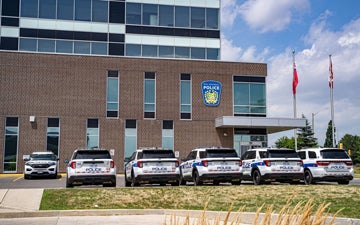Peel police board approves 9.9 per cent budget hike, one year after passing an unprecedented $144M spending increase

Residents and local leaders in Mississauga are again raising affordability concerns over property taxes as Peel Police Services budget hike goes to Council
MISSISSAUGA, Oct. 31, 2025 – The Peel Police Services Board has approved a $837.3-million budget for 2026 — a 9.9 per cent increase over the 2025 budget, itself 23 per cent higher than the previous year.
Police said this latest budget increase will help fund 175 new officers and 25 civilian staff positions in areas such as digital forensics and crime analytics as part of a multi-year plan to expand the force’s capacity across the region.
The decision, made at the Peel Police Services Board meeting on Oct. 24, comes one year after the board approved a 23.3 per cent increase for 2025 — the largest in Peel police history. It added about $144 million to the operating budget.
With this latest hike — an extra $75.4 million over 2025 — residents and local leaders are again raising affordability concerns.
The budget now moves to Peel’s regional council for approval. The regional council budget meeting is scheduled for Nov. 20.
Residents express concern on taxes
During the Friday meeting, residents urged the board to be cautious about spending, warning that back-to-back double-digit budget hikes are pushing homeowners to the brink.
Mike Harris, a Mississauga resident, said many residents can’t absorb another sharp increase on their property tax bills.
“For somebody like myself who is geared down and not making as much money as I used to … we’re in a tight economy. We’re looking for fiscal restraint,” he said.
Sue Shanly is chair of the Mississauga Residents’ Associations Network (MIRANET) — a coalition representing neighbourhood groups across the city. Shanly said affordability has now eclipsed crime as the top concern she hears from residents.
“We’re struggling. The economy has gone south even further this year,” Shanly told the board. “The financial impact of your budget is being felt.”
She said many homeowners, particularly seniors, worry they will be forced to leave the city if police budgets continue to climb.
“We’d like to see a line-by-line budget and real accountability,” she said. “Mississauga is already required to fund about 62 per cent of the police budget, and that adds to the problem for our residents.”
Shanly added that MIRANET wants to work with the board to “find efficiencies” to help lessen the burden on taxpayers moving forward.
“How can Mississauga homeowners stay in their homes in the face of such property tax increases that we’ve felt this past year, and that we’re going to feel again this next year?” she said.
Police and board defend increase
Board members and police leadership said the increase is necessary in the rapidly-growing region. They described the 2026 budget as more restrained than last year’s 23 per cent hike while still keeping pace with service demands and population growth.
Coun. Matt Mahoney, who sits on the board, said members tried to balance fiscal responsibility with the need to preserve public safety.
“It is our responsibility to ensure Peel Regional Police has the resources it requires to deliver adequate and effective policing, while exercising strong oversight, strong governance and accountability to regional council and, ultimately, to the community we serve,” he said.
Mahoney said the 2026 budget maintains the momentum from last year’s historic hike to address officer shortages, bringing Peel closer to its target of 600 new officers over three years.
“Cost of living and other things are on the rise, but policing is something that always needs to be at the forefront,” he said.
Deputy Chief Lauren Jackson told the board that about 40 per cent — or $30.3 million — of the overall increase will go directly toward new staffing.
Chief Nishan Duraiappah said the 2026 plan will improve the police’s public visibility and response times.
“This region is not the way it was 10 years ago,” he told the board. “People need to see us on the streets. We need to be able to respond to what causes the greatest harm in our community, and 175 officers … will continue to allow us to do that.”
Brampton Mayor Patrick Brown, who also sits on the board, commended the police for the budget report and expressed he would support it at regional council.
“I think you’ve done the right balance in terms of what’s necessary for public safety, while knowing that people are struggling with an affordability crisis,” said Brown.
Political reaction split
Outside the police board, local leaders remain divided over the continued pace of budget growth.
Mississauga Mayor Carolyn Parrish said residents were expecting a pause after two years of steep increases — 14 per cent in 2024 and 23.3 per cent in 2025 — and that another near-double-digit rise will be difficult to justify.
“I do not believe Mississauga taxpayers will be happy with a 9.9 per cent increase,” Parrish said in a written statement to Mississauga News. “At a time when households are feeling severe financial pressures, the region should be trying to balance critical safety needs with reasonable affordability for taxpayers.”
Parrish cited a 2023 University of Toronto study that found no consistent correlation between police spending and lower crime rates.
“Investing in education, jobs, housing and appropriate social services makes more of a difference,” she said.
Mississauga Coun. Martin Reid defended the plan, calling it responsible and forward-looking, and said it would strengthen front-line safety and service capacity. He added that it would have a moderate impact on the overall property tax bill.
“Peel Police is already demonstrating strong results: faster 9-1-1 response times, visible officer presence, reductions in key crime categories and greater community trust,” he said. “I believe this is a responsible, forward-looking budget that protects the progress we’ve made.”
Community advocate questions sustainability
Community advocate David Bosveld said the pace of police budget growth has become “unsustainable.”
“The taxpayer doesn’t have endless dollars for policing or anything else,” he said. “The real issues that need support are housing, jobs, education and mental-health care. Those things are constantly being underfunded while more of the public purse is being handed to policing.”
David Bosveld, a community activist, critiqued the budget hike, saying “the taxpayer doesn’t have endless dollars for policing.”
Bosveld added that while residents’ fears of rising crime and car thefts continue to drive political decisions, more money for police “doesn’t address the root causes.”
“You can round up all the offenders you want,” he said, “but new ones will take their place if the social determinants aren’t being fixed.”
Mzwandile Poncana is a Local Journalism Initiative reporter with Mississauga.com.










(0) Comments